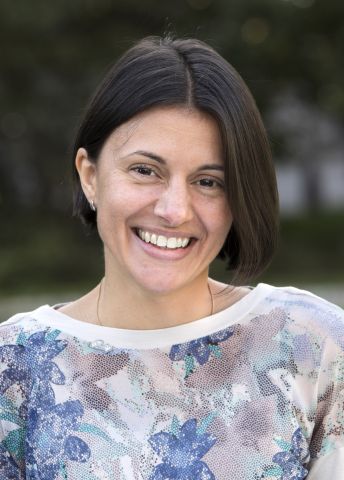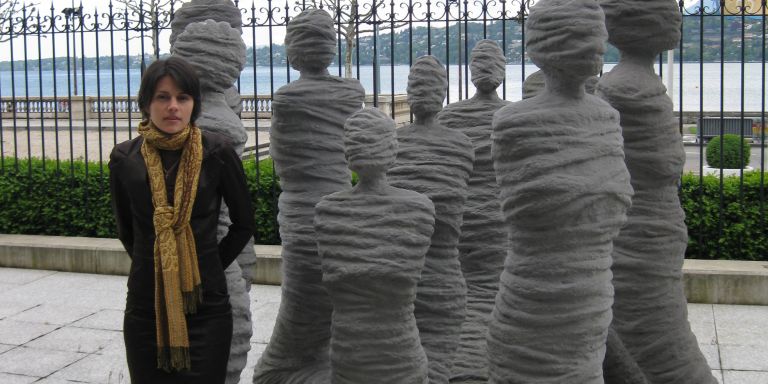
Vladislava Stoyanova
Associate Professor of Law
Wallenberg Academy Fellow 2019
Institution:
Lund University
Research field:
Human rights, migration law and public international law


Wallenberg Academy Fellow 2019
Institution:
Lund University
Research field:
Human rights, migration law and public international law
Even as a teenager Stoyanova was interested in migration issues. She did voluntary work helping refugees, and knew that she wanted to continue working in the field of human rights. A career in research was by no means a given, but her master’s dissertation in law gave her a strong incentive to continue her university career.
“I like the challenge of struggling with and reworking ideas as they evolve into a well-structured piece of writing on an important subject.”
In her doctoral thesis Stoyanova addressed the convoluted relationship between different terms used to describe exploitation of labor. She showed that the relatively new term “human trafficking” is inadequate. It would instead be better to return to older concepts such as slavery, servitude and forced labor. This would help to create a better focus in efforts to prevent exploitation of migrants.
Thanks to the Wallenberg Academy Fellow grant, she will now have the time and resources to pursue new topics.
“I’ve been fortunate to receive this funding at a good point in my career. Immediately after obtaining a PhD the way forward is not always clear, but now I have the opportunity to set up my own research team for a five-year project.”
Conflicts have led to the migration crisis of 2015. Many people have been displaced and have migrated in the hope of building up a new future. Meanwhile, Sweden and other EU countries have tightened up immigration and refugee policy.
Stoyanova intends to analyze how interpretation and operation of laws and regulations impact the chances of migrants integrating in society. There is an obvious conflict of interests here.
“On the one hand, we have a desire on the part of affluent nations to control migration and decide who is allowed to stay in the country. On the other, there is the migrants’ need to find work or to be reunited with their families.”
The conditions governing family reunification is an example of how laws can have a huge impact on migrants’ lives.
“Politicians in Sweden have proposed restricting the scope for family reunification, which may hinder integration. If you can’t live with your family members, you are unlikely to feel at home in the country.”
Stoyanova is studying whether a better balance can be achieved in laws and regulations so as to meet the needs of the individual migrants and of the host society. She is examining national laws and judgments from Sweden, Germany and other countries, as well as EU legislation and judgments. She is also studying a number of legal areas that potentially impact integration of asylum seekers and refugees.
“I’m taking a look at asylum law and migration law, as well as areas such as employment law, anti-discrimination laws and family law. Some of them are heavily influenced by EU law.”
Fundamental protection of the individual is provided by human rights treaties, such as the UN Universal Declaration of Human Rights and the European Convention. They are universal and have positive impact, but are often couched in abstract terms. Stoyanova elaborates:
“If we delve just a little deeper, we soon notice that the language of the law does not give us unequivocal answers. The law instead provides a basis for different interpretations of human rights in different situations.”
Those interpretations do not always favor migrants.
“But it’s important to acknowledge that laws give scope for interpretation, and cannot provide solutions to all problems.”
She stresses that research must not be fashioned into a tool for activism. The issues are complex by their very nature, and researchers have to bear this in mind. But this does not mean that the research will not benefit society. One contribution Stoyanova herself makes is to draft opinions on new national laws during the consultation phase.
“It’s a very tangible way to make a contribution. I sometimes also assist when the courts need an expert opinion on a question of law.”
“The grant provides both resources and ample time to develop new ideas. It usually takes a long time for research to yield findings that have a real impact, and it is gratifying to be given this unique opportunity as a Wallenberg Academy Fellow.”
Meetings with her students give Stoyanova ideas for new topics to research. She leads several courses on migration law, and likes to use fresh examples, which gives her teaching an additional edge.
“It’s really satisfying to be able to use recent research findings and apply them directly in the classroom. It often generates dynamic discussion, and students offer interesting questions and criticism.”
She hopes that the ongoing project on integration will be of use both in Sweden and elsewhere over the next few years.
“The topic is high up on the EU agenda, and a lively debate is in progress. I hope my research will be relevant to the question of how to negotiate a course between the various conflicts of interest existing in society.”
Text Nils Johan Tjärnlund
Translation Maxwell Arding
Photo Markus Marcetic, Nikolay Ilchev, Vladislava Stoyanova, Julie Ricard, Maria Teneva